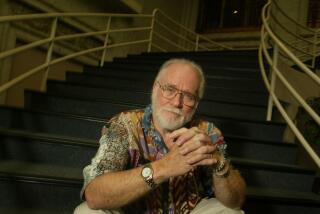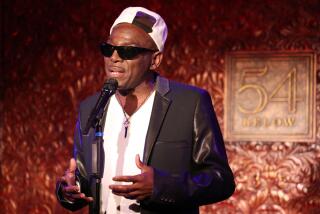PASSINGS: Norman Felton, Evelyn Lear
Norman Felton
Producer of ‘Dr. Kildare,’ ‘The Man From U.N.C.L.E.’
Norman Felton, 99, who developed and produced the successful 1960s TV series “Dr. Kildare” and “The Man From U.N.C.L.E.,” died of natural causes June 25 in Santa Barbara, his family said.
Felton was born April 29, 1913, in London and came to the United States with his family as a teenager. He studied theater arts at the University of Iowa, earning a bachelor of fine arts degree in 1939 and a master’s in 1940.
FOR THE RECORD:
Norman Felton: A brief obituary of TV producer Norman Felton in the July 6 LATExtra section reported that he won Emmy awards for the series “The Man From U.N.C.L.E.” and the movie “Babe.” He was nominated for the awards but did not win. —
After directing community theater productions in the Midwest, he worked as a radio producer in Chicago, then moved to New York to write, direct and produce at a time when live television shows dominated the airwaves.
In the late 1940s and early ‘50s, he was a producer on “Studio One,” “Robert Montgomery Presents” and other dramatic anthology programs. After a stint as director of programs for CBS, he moved to MGM to develop shows under his company banner Arena Productions.
Besides the hospital drama “Dr. Kildare” and the spy spoof “The Man From U.N.C.L.E.,” he helped bring to television “The Lieutenant,” “The Girl From U.N.C.L.E.” and “Strange Report.”
He won Emmy Awards for producing “The Man From U.N.C.L.E.” in 1966 and for producing the TV movie “Babe” in 1976.
Evelyn Lear
Soprano won renown in contemporary roles
Evelyn Lear, 86, an American soprano who became a star in Europe singing some of the most difficult roles in contemporary opera, died Sunday at a nursing home in Maryland, said her son, Jan Stewart. She had been ailing for months after a mild stroke.
Lear and her husband, acclaimed bass-baritone Thomas Stewart, sang together around the world for decades before settling in Rockville, Md. He died in 2006.
After being overlooked by U.S. opera houses, Lear won fame in the early 1960s in Vienna singing the title character in Alban Berg’s “Lulu,” a role she learned in three weeks.
People saw “this phenomenal performer who had all of the musicality and all of the control that was needed for this super-humanly difficult role,” said Roger Pines, dramaturge of the Lyric Opera of Chicago. “She had it all: beautiful woman, very fine actress, wonderful with languages.”
She was born Evelyn Shulman on Jan. 8, 1926, in New York City to a classical singer and her lawyer husband. At about age 18, she married physician Walter Lear and had two children before divorcing.
While studying at the Juilliard School, she met Stewart and they married in 1955. They moved to Berlin, where they sang at the State Opera and throughout Europe.
She sang “Tosca,” “The Marriage of Figaro,” “The Merry Widow” and many other roles. In 1967, Lear debuted with New York’s Metropolitan Opera as Lavinia in the world premiere of Marvin David Levy’s “Mourning Becomes Electra.” Her Met finale was in 1985.
In the late 1960s, she began losing much of her vocal range and had to learn to sing all over again.
With her husband, she nurtured young artists through the Evelyn Lear and Thomas Stewart Emerging Singers Program of the Wagner Society of Washington, D.C.
— Times staff and wire reports
More to Read
Start your day right
Sign up for Essential California for the L.A. Times biggest news, features and recommendations in your inbox six days a week.
You may occasionally receive promotional content from the Los Angeles Times.



















































